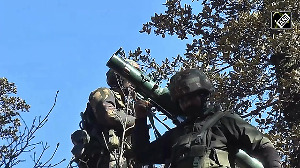The arrest of sub inspector Biju Salim, who has been accused of raking up communal sentiments, raises more questions than it answers. Vicky Nanjappa reports
A sub inspector from Kerala was recently arrested for allegedly forging a letter and leaking it to the press. The letter, which appeared in the media, stated that "the government had plans to hack 200 plus emails mostly belonging to Muslims."
The content of the letter was the cause of an uproar in the Kerala assembly and the furore led to the arrest of sub inspector Biju Salim.
Now, whether the letter was really forged or was the arrest carried out due to the uproar in political circles is being investigated. The police say that Salim had forged the letter and leaked it to the media knowing well that such a publication could lead to a communal unrest in the state. Moreover, they also accuse him of being part of a larger conspiracy aimed at disrupting peace in the state. In other words, what the police are trying to say is that Salim attempted to do something that would normally be associated with terror groups. The sub inspector has been accused of raking up communal sentiments in the state.
However, there appears to be a lot of confusion regarding the case. Kerala has become an epicentre of terrorist activities in the past couple of years and is being closely monitored.
The very fact that Al Qaeda's Pakistani leader Ilyas Kashmiri chose to pick up youngsters from Kerala shows how preferred the state is for terror activities. According to the police, hawala money amounting to nearly Rs 10,000 crore is being pumped into the state and a large part of this amount is being used for terror activities.
Surveillance is part of the job for any spy agency. Although unofficial, one cannot deny that it isn't taking place. In many cases it has been found that governments have ordered such probes and have often used such information to keep political rivals or coalition partners on tenterhooks. Kerala is no stranger to the evil of politics being mixed with crime. There are various small parties that have often found themselves being dragged into the terror nexus. During election time such activity is usually very high and anti-social elements, including small time terror organisations, have been used to further political causes.
While there is a good possibility of the letter being forged, the events that led up to the incident tell a different picture; this is going by the manner in which the system reacted to the incident.
Salim was part of the high-tech cell that was involved in surveillance and hence there is a high possibility he had information regarding secret documents and confidential orders of the government. He was part of the cell since October and had been posted on deputation. In addition to this he was also doing his MBA after having completed his journalism and post graduate diploma in computer applications course.
The fact of the matter remains that Salim is an offender as he is not supposed to pass on such information or documents to the media. But whether he is part of a terror group or not is something that an investigation would tell. However, he can be booked under the Official Secrets Act for passing on confidential information.
This case has had many twists and turns and it is interesting to note that Salim was not suspended for forging a document, but for leaking a letter sent by the superintendent of police to the additional director general of police. In the communication it was stated that an inquiry be conducted on 268 email IDs of persons allegedly belonging to the Students Islamic Movement of India.
However, the counter attack to such a probe was that keeping a tab was illegal, especially when the list of 286 had many persons who did not even have a petty crime registered against them.
When the news first came out the chief minister had said that the matter would be investigated and also advised the media from restraining from writing such communally sensitive articles. The probe commenced mainly to look into the leakage of the letter and a special team was constituted only to probe this angle. The probe found that the letter had been leaked to the media, but later on it was stated that the letter was forged and given to the media with an intention of creating communal tension.
The police, however, say that there are many theories and they need to thoroughly probe the matter. If the first round of probe showed that the letter had been leaked it means that there was actually a letter of this nature in place. In that case, why did it become a forged document later?
Email or phone tapping requires a go ahead from the home ministry and only then does the action become a permissible one according to an order of the Supreme Court of India. However, when one has to fight a menace called terrorism, it is very important that tabs are maintained as one needs to act quickly and cannot be entangled in red tape.







